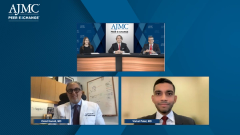
Socioeconomic Implications of CSCC and BCC
Experts explore the socioeconomic impact of CSCC and BCC, and which late-stage patients will derive the greatest benefit from hedgehog inhibitors, immunotherapies, and other emerging treatments.
Episodes in this series

This is a video synopsis/summary of a Peer Exchange involving Jason Luke, MD, FACP; Christopher Barker, MD; Omid Hamid, MD; Vishal Patel, MD; and Catherine Pisano, MD.
Pisano noted that patients presenting with advanced cutaneous squamous cell carcinoma (cSCC) and basal cell carcinoma (BCC) often have limited health care access and resources. While immunotherapy dramatically benefits these individuals, high out-of-pocket costs can be prohibitive without insurance coverage or patient assistance programs. She advised avoiding hedgehog inhibitors for malnourished and/or economically disadvantaged BCC patients given the additional toxicity concerns that may worsen nutritional status. Hamid emphasized the importance of corporate-sponsored patient assistance programs and co-pay support in accessing therapies. He also stressed educating patients on the realities of systemic treatment, as many view skin cancers as easily resolved by surgery alone. The extensive monitoring and potential adverse effects associated with targeted and immune-based medications differs greatly from this perception.
Video synopsis is AI-generated and reviewed by AJMC® editorial staff.
Newsletter
Stay ahead of policy, cost, and value—subscribe to AJMC for expert insights at the intersection of clinical care and health economics.









